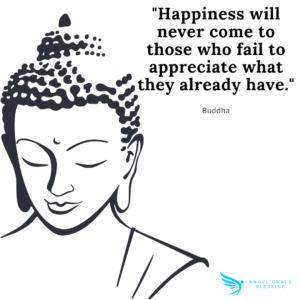In the hurried pace of our modern lives, where ambitions soar high and the pursuit of more is often seen as the benchmark for success, there lies a timeless quote attributed to Buddha that serves as a gentle reminder of what truly matters in the search for happiness:
“Happiness will never come to those who fail to appreciate what they already have.”
In a world saturated with consumerist messages and a constant barrage of advertisements beckoning for the newest, the latest, the shiniest, the essence of this profound statement might seem misplaced. Yet, perhaps it is exactly this ancient wisdom which holds the key to unlocking a sense of lasting fulfillment in our increasingly complex and ever-changing lives.
The Paradox of Plenty
We are living in an era of unprecedented abundance. Technology has radically transformed the way we live, work, interact, and seek entertainment. With this plenty, however, comes a unique paradox – as our lives grow richer with goods and experiences, our contentment seems to diminish. How can this be?
The answer may lie in the human tendency to adapt to circumstances; what psychologists call the ‘hedonic treadmill.' We quickly grow accustomed to new acquisitions or circumstances that initially brought joy. As these become part of our norm, we seek yet higher levels of stimulation or belongings, and so the cycle continues, often leaving us as discontent as we were at the outset.
Buddha's message cuts through this cycle, indicating that happiness is not a product of getting what we don't have, but rather appreciating what is already within and around us.
Appreciation: The First Step to Happiness
Appreciation is more than just a passive feeling of thankfulness. It is an active, deliberate process of recognizing the value in our lives – however small or mundane some aspects may appear. It involves shifting focus from what is missing to what is present, from lack to abundance, from discontent to gratitude.
Scientific research backs up the benefits of appreciation. Studies show that practicing gratitude can increase psychological well-being, enhance relationships, improve health, and even lead to greater happiness. By valuing the people, experiences, and possessions we already have, we may find that the hunt for happiness becomes a journey of recognizing the wealth that is already ours.
Living in the Present: Buddha's Enduring Wisdom
At the heart of Buddha’s teachings is the importance of living in the present moment. The past is immutable, the future unpredictable, but the present is where life happens. Herein lies the crux of appreciation – to be mindful and aware of the present and to find joy in the very act of living.
When we fail to appreciate the present, we bypass the small joys and the beauty that life offers in every moment. Consumed by thoughts of what could be or what has been, we miss out on the profound depth of what is. This, the Buddha suggests, is where true happiness can be found, not in the relentless pursuit of what we lack.
Applying Buddha's Teaching in Our Lives
So how can we put this wisdom into practice?
Start with the immediate: Begin each day with a note of gratitude. It might be for a caring relationship, a comfortable home, good health, or simply the sunrise. Grounding yourself with appreciation for the present sets a positive tone for the day.
Mindfulness practice: Engage in regular mindfulness or meditation sessions. The simple act of breathing and being can help to root you in the now, aiding your awareness of the wealth you carry within you and around you every day.
Give to others: In giving, we receive, not merely metaphorically but in the real emotional currency of happiness. Volunteer your time, share your resources, and be generous with your presence. In lifting others, you will find your own spirits buoyed.
Limit comparisons: Comparing our lives to those of others is a sure path to discontent. Remember that each life is unique, and so too are its blessings. Cherish your journey without measuring it against someone else’s.
Embrace simplicity: Simplifying your life by decluttering your space and calendar can make room for you to appreciate the truly important aspects of your life. More isn't always better; often, it's simply more.
Conclusion
In a single, profound sentence, Buddha encapsulates a fundamental truth about human contentment. “Happiness will never come to those who fail to appreciate what they already have” resonates across millennia because it speaks to the core of our being. It is an invitation to break from the relentless pursuit of more, to pause, reflect, and give thanks for the countless gifts we possess.
In doing so, we find happiness not as a distant goal on the horizon, but as a close companion on our journey, born out of appreciation for the simple, immeasurable wealth of our everyday lives. Let us then heed Buddha's words and cultivate a heart of gratitude, for it is there that the seeds of true happiness are sown and nurtured.
As we reflect on the timeless wisdom of Buddha, let us seal our contemplation with a positive affirmation, inviting the energy of gratitude and joy into our lives:
“I am a vessel of gratitude, and my heart overflows with appreciation for the abundance that surrounds me. In acknowledging the blessings of this moment, I invite true happiness into my life. I release the illusions of lack and open myself to the infinite possibilities of joy. With each breath, I embrace the simplicity of life, finding beauty in the ordinary and celebrating the extraordinary within. I am grateful, I am content, and I am a magnet for the abundance of love and blessings that the universe graciously bestows upon me. So it is, and so I affirm.”
May this affirmation resonate within our beings, guiding us toward a life illuminated by gratitude, joy, and the radiant light of inner contentment.


















